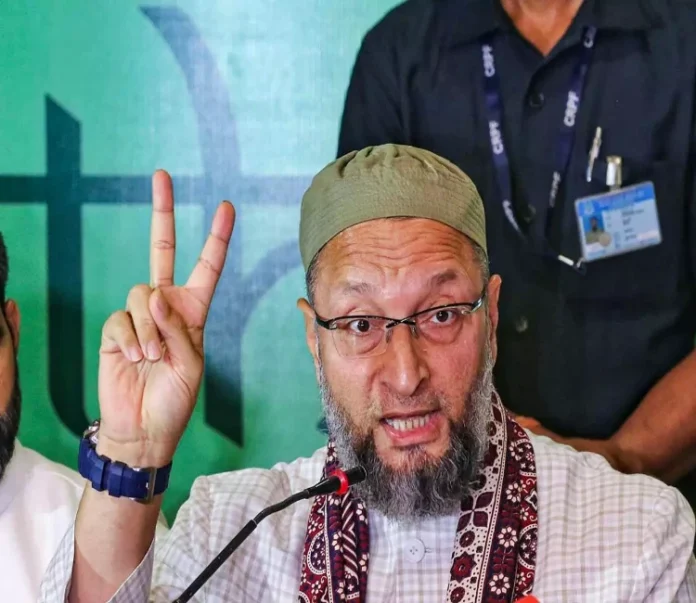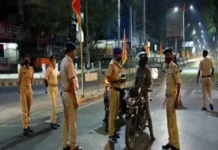Since a long time, AIMIM supremo Asaduddin Owaisi adopts the policy to ignore women to fight elections. This attitude of AIMIM in rejecting the ‘Women’s Reservation Bill’ raises questions about the role played by the party’s brand of politics and providing equality to muslim women.
Politics in India has remained a male domain despite the constitutional promise of justice and equality for all citizens, irrespective of gender. Our patriarchal society treats women as second-class citizens.
They often face discrimination in the public and personal spheres. Seven decades after independence, women are highly under-represented in legislative bodies.
The 17th Lok Sabha has 78 women members, and the Rajya Sabha has 24. Together, they comprise less than 15 percent of members of Parliament. Various state Assemblies have less than 10 percent of women elected members.
AIMIM opposed women’s quota Bill
The Women’s Reservation Bill languished for years owing to the apathy of our political class, which has collectively failed to prioritise women’s representation.
Nevertheless, in a historic development, the Bill referred to as “Nari Shakti Vandan Adhiniyam” or the Constitution [128th Amendment Bill] was passed almost unanimously by both houses in September.
Its almost unanimously because two MPs from the All India Majlis-e-Ittehadul Muslimeen (AIMIM) opposed the Bill in what has become characteristic of the party they represent.
There has been a growth of women’s movements for gender justice and equality country-wide, leading to increased awareness, particularly in the last three decades.
It has built a climate to compel political parties to backtrack on official posturing based on patriarchal mindsets.
Political parties today want to be perceived as supporting women’s causes. In the era of technology and internet connectivity, it has become politically incorrect to display misogynist attitudes openly.
Besides, women voters are becoming a significant constituency for political parties everywhere. No wonder they had to support the Women’s Reservation Bill.
No pretence of women’s equality surprising
Apparently, no such compulsions seem to exist for AIMIM, which claims to champion justice for Indian Muslims. It seems they want to fight the approaching elections in Telangana and other states without any pretences to support women’s equality.
They do not think voters will punish them for rejecting the Women’s Reservation Bill. Such an attitude raises more significant questions about the democratic participation of Indian Muslims, particularly women, and the role played by the AIMIM brand of politics.
As per media reports, the party president and Lok Sabha MP from Hyderabad, Asaduddin Owaisi, opposed the Women’s Reservation Bill because it would provide reservations only to “savarna women”.
He questioned the provisions of the Bill and asked why Other Backward Classes (OBC) and Muslim women, who have even lesser representation in Parliament than upper caste women, are not being given any quota within the larger women’s reservation quota.
He reportedly said, “We know Muslim women are seven percent of the population, but in this current Lok Sabha, their representation stands at only 0.7 percent.”
AIMIM ignores women candidates during polls
To begin with, one might ask how many tickets AIMIM has given to Muslim women candidates in state and general elections in its entire history. How many Muslim and OBC women represent AIMIM as elected representatives or even in decision-making positions within the party?
The AIMIM stance on women’s leadership and participation in public life does not seem to be in sync with the rising hopes and aspirations of Indian Muslim women as witnessed in the last two decades.
In the past, AIMIM was known as a political party of Old Hyderabad city, with Asaduddin Owaisi as the sole MP since 1999. The rise of the party beyond its traditional boundaries coincided with the rise of Hindutva politics.
In the last 10 years, the party has been filing candidates at local levels in Maharashtra, Gujarat, Bihar, Uttar Ptadesh, and a few more states with a small degree of success.
Typically, their vote share has eaten into the votes of Congress and other non-BJP regional parties. Many Opposition parties have openly accused AIMIM of being a vote spoiler B Team of the BJP. One cannot grudge a political party their right to contest elections.
Double standards in party principles
Owaisi has been vocal and articulate inside Parliament and outside in public meetings, invoking the Constitution to uphold the rights of Indian Muslims. He has been invoking constitutional principles of justice, equality, democracy and secularism in his opposition to mob lynchings, “love-jihad” laws, and other issues such as the Citizenship Amendment Act (CAA) and the proposed nationwide National Register of Citizens (NRC).
In fact, it is the right thing to do. But it seems to be a case of double standards. These principles of justice and equality are forgotten when giving Muslim women equal rights within the family and community.
Indian Muslim women are discriminated against with practices such as child marriages, unilateral divorce, polygamy, denial of custody and guardianship of children, and denial of equal share in property in the absence of reformed and codified personal laws.
Owaisi represents the orthodoxy with archaic views that deny equality to women and confine them within the four walls of the home.
His vocal opposition to some of the Narendra Modi government’s policies has earned him admirers and followers amongst certain liberal secular sections who have chosen to overlook the conservative misogynist position of his party over the abolition of instant triple talaq.
Owaisi is orthodox in his views
Owaisi is personally opposed to reform in Muslim personal law; he took a public stand supporting the abhorrent practice [now set aside by the Supreme Court] and opposing the Muslim women who fought against triple talaq.
He continues to be an important member of the orthodox Muslim Personal Law Board that believes in perpetuating unfair discriminatory practices under the garb of upholding Shariat.
Hyderabad is known for some of the worst discriminatory practices, such as muta or temporary marriages of underage girls. The classic film Bazaar, by Sagar Sarhadi, poignantly captured the painful plight of adolescent Muslim girls in forced marriages with older men.
The character played by Supriya Pathak brings out the emotional trauma and predicament of a hapless girl who is the victim of both poverty and patriarchy. Alas, the party of the Old Hyderabad city never thought it fit to work towards eradication of such evil practices taking place under their noses.
As Telangana goes to polls, the AIMIM is likely to field only 9 candidates in Hyderabad area out of the 119 constituencies. And they have the list of candidates in Rajasthan as well.
Women candidates will continue to be missing from the lists. The party may again invoke Jai Bhim without adequately appreciating Ambedkar’s ideology of social democracy and the importance of equality for women.
In the name of uniting Muslims, it may further strengthen regressive thinking and orthodoxy within the Muslim community. They might win seats here and there, but it can lead to untold damage to our already-strained plural society.
Why AIMIM seeks internal quota in Women’s Reservation Bill, but has never fielded a woman in Assembly elections?
The AIMIM, which has 20 sitting women GHMC corporators, has never allotted an Assembly election ticket to a woman since Independence.
It is well known that the AIMIM was the only party that opposed the landmark Women’s Reservation Bill in Parliament. Equally well known is the reason its president Asaduddin Owaisi gave for opposing the Bill.
The Hyderabad parliamentarian said the landmark bill would provide reservation only to “savarna women”. He asked why Backward Class (BC) and Muslim women — who have even lower representation in Parliament — were not being given any quota.
In the run-up to the Telangana Assembly elections on 30 November, speculation was rife on social media that the AIMIM could announce Syeda Falak, an international karate athlete, as its Jubilee Hills candidate in a groundbreaking move.
However, that hope was dashed on 6 November, when the party announced Mohammed Rashed Farazuddin, a former corporator from Shaikhpet, as its candidate for the seat.
As surprising as it might have appeared then, history has always been on the side of what happened that day.
This is because the 96-year-old political outfit, given its present form by Asaduddin’s grandfather Abdul Wahed Owaisi, has never fielded a woman candidate in the Assembly elections.
Only women corporators, no woman MLA
The AIMIM, which emerged as the second-largest party — second only to the TRS (now the BRS) — in Telangana in 2018, has seven sitting MLAs in the Assembly.
This time around, the party has announced candidates for nine seats, including Rajendra Nagar and Jubilee Hills, of the total 119 in the Assembly.
The AIMIM also has 44 corporators after winning as many seats in the 2020 Greater Hyderabad Municipal Corporation (GHMC). Of them, 20 are women. In the 2016 GHMC elections, 19 of the 44 AIMIM corporators were women.
It should be noted that 50 percent of the seats were directly reserved for women in the last GHMC elections, which were conducted in 2020.
However, there were more men candidates, reportedly, than women in the list released by the Telangana State Election Commission (TSEC).
Incidentally, V Bhanumathi, a Hindu OBC candidate, won the Borabanda municipal division byelection held in 2013 on an AIMIM ticket after the sitting corporator was disqualified.
Meanwhile, when #Khabarlive analysed the AIMIM’s Uttar Pradesh website — as no other website of the party could be found online — at least 14 significant leadership posts, including national leaders and state presidents, were all headed by male members.
Other parties in Telangana
Among the other political parties in Telangana, the ruling BRS has fielded six women candidates — Sunitha Laxma Reddy, Sabitha Indra Reddy, G Lasya Nanditha, Gongidi Sunitha, B Haripriya Naik, and M Padma Devender Reddy.
For the BJP, women candidates will be contesting on 13 seats — the highest by any political party in the state.
These women candidates are Amarajula Sridevi, T Aruna Tara, Bodiga Shobha, Rani Rudrama Reddy, Megha Rani, K Niveditha Reddy, Ch Srilatha Reddy, Bhukya Sangeetha, Rao Padma, C Keerthi Reddy, Annapurnamma Aleti, Boga Sravani, and Kandula Sandhya Rani.
While the numbers amount to a mere over 5 percent of the total candidates for the BRS, they are over 8 percent for the BJP.
When it comes to the Congress, considered to be one of the foremost rivals of the BRS in Telangana, the party has fielded nine women (around 7 percent).
These candidates are Kota Neelima, P Chittem Reddy, Saritha Thirupathaiah, N Padmavathi Reddy, Singapuram Indira, Yeshashwani Memidila, Konda Surekha, D Anasuya Seethakka, and GV Vennela.
The Bahujan Samajwadi Party’s (BSP) Telangana wing has allotted tickets to 11 women candidates, nine of whose nominations have been accepted.
These women candidates are Uyaka Indira, Jamuna Rathode, Dasari Usha, A Laxmi, KS Ramulu, KN Kistappa, BS Srinivasulu, M Priyadarshini, and G Parvathi Naik. The party has also fielded a transperson C Pushpita Laya (Warangal East), who is said to be the first-ever candidate from the community.
Fundamentalism, patriarchy across parties
E Venkatesu, a professor with the Department of Political Science at the University of Hyderabad (UOH), said he believed that the AIMIM allotting tickets to women members for municipal elections was inevitable due to the constitutional mandate.
“The AIMIM was the only party to oppose the Women’s Reservation Bill on the grounds of internal reservation for Muslim women, which was quite a progressive step. But when it comes to internal democracy, there has been a gender gap,” he told #Khabarlive.
The professor held patriarchy and religious beliefs responsible for women leaders everywhere not getting their share of political space.
“All religious beliefs are basically ruled by tradition, whereas our Constitution is a modern one, trying to make the society more democratic,” he explained.
K Nageshwar, a noted political analyst and former member of the Andhra Pradesh Legislative Council, said one of the main characteristics of all the religion-based parties was to oppose women’s empowerment because fundamentalism always supports patriarchy.
“Any religious political party — whether from Islam, Hinduism, Christianity or Sikhism — is always opposed to women. So, there’s no surprise. The AIMIM is a patriarchal party, a fundamentalist party. So, obviously, the male members don’t like women to be on a par with them,” he said.
“Hindu fundamentalists oppose the entry of women into Sabarimala temple, and Muslim fundamentalists oppose the ablation of triple talaq, like the AIMIM opposed the verdict in the Shah Bano case,” Nageshwar, who is also a former journalist and currently a professor at Osmania University, told #Khabarlive.
V Srilata, a Political Science professor at Osmania University, viewed that albeit more women are getting educated and also holding several key positions in society, they are still not seen as decision-makers.
“Women are not conditioned in the direction where they could stand for decision-making. One reason can be because we don’t have that social structure. Even the AIMIM is following the same path. They have very narrow-minded education and still follow the values of a close-ended society, not a broad-minded one,” she said.
Other factors
Venkatesu, who is also a member of CSDS Lokniti, also said all the mainstream political parties — the Congress, the BJP, the TDP, the BRS, the Rashtriya Janata Dal, the JD(U), and others — mostly fielded women belonging to the upper socio-economic groups.
“When you look at the socio-economic profile of the elected woman MLAs and MPs of big parties, where is the lower-caste and class representation?” he asked. “It is only the upper caste because they are financially empowered.”
He continued: “Secondly, they must have been born to a political family. Indra Gandhi was born to a political family, Sabitha Indra Reddy is the wife of a former minister, and then there is K Chandrashekar Rao’s daughter K Kavitha. Current GHMC Mayor Gadwal Vijayalaxami is the daughter of incumbent BRS MP Keshava Rao.”
Noting that the AIMIM was not an exception, he opined, “Consciously or unconsciously, this gender gap or patriarchal character exists in all political parties. What was the representation of women in the Congress? It never reached more than 10 percent.”
Noting that the AIMIM was unable to accommodate women as they had fewer MLAs — seven to nine only — and one MP, the professor said he believed that the party was also attempting to show itself as a secular outfit by allotting more tickets to women in the local body elections.
“When it comes to the local bodies, they are supposed to choose women — whether they are Hindus, Dalits, or Muslims. See the example of V Bhanumathi. This is because there is a reservation for women, and they will also show that they are developing some sort of a secular character,” he explained.
What do AIMIM members say?
The AIMIM Women’s Wing’s former joint convenor Aisha Rubeena acknowledged that no woman has ever been given an Assembly election ticket by the AIMIM.
However, she also noted: “The AIMIM is very small party, with only seven MLAs, and they have been MLAs for a long time now.”
Therefore, they were more experienced on the job, which meant that whether the ticket was given to a man or woman, it would go to a new person, she told.
However, for political science professor Venkatesu, longstanding politicians holding crucial positions has been a trend in the Indian electoral democracy, which he believes is akin to a banyan tree.
“Rather than allowing grass to grow under their banyan tree, they chose themselves. Look at the communist parties or the Congress, or even non-religious political parties. We can’t find a culture of democratisation. Once you become a president or a leader, you will be in the same position until your death,” he remarked.
Asked whether women should be given a ticket in the Assembly elections, Rubeena, said the ultimate decision would be that of party president Asaduddin Owaisi. “He will give an Assembly election ticket to a woman when he thinks the time is appropriate,” she said.
According to her, the AIMIM has more women in elected positions in the GHMC because women work better at the grassroots than their male counterparts. “That is the reason the party gives them tickets: It, too, believes that,” she said.
Former AIMIM MLC Syed Animul Pasha Quadri said that if every political party made it mandatory to allot a certain number or ratio of tickets to women in the Assembly elections, the AIMIM would not be an exception.
“We are a small party in comparison to several others. How many women candidates were elected in the 2018 Assembly elections? Why should the AIMIM stand out? Where are the TDP, the BJP, the Congress, the BRS and the other parties?” the former journalist asked South First.
The calls and messages to the AIMIM chief Asaduddin Owaisi remain unanswered, South First will update the copy as a response is received.
Meanwhile, Venkatesu said he believed that the situation would not change unless the voice calling for reform came from within the communities that have been demanding representation on the basis of gender. ■ #hydnews #khabarlive #hydkhabar







